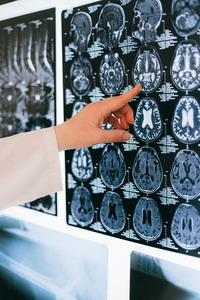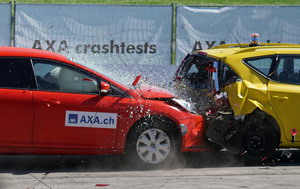
I took a neurology seminar via Zoom last week because it looked interesting and I could get 6 relicensing hour credits without having to go to some hotel in the Bay Area like I used to have to do. The class turned out to be even more interesting than I thought because most of the focus was on concussions. Hardly anything was known about concussions back when I went to school. Since then the field has been exploding with new findings. Of particular interest was the personal view the presenter of the class had. He had a concussion eight years ago and is still working to get over the consequences even now.

Let’s give away a couple of the highlights from the seminar right off the top. First, most concussions do not come from a blow to the head. This belief that concussions come from direct impact has been around forever and is so deeply entrenched that insurance adjusters will insist that an accident victim could not possibly have a concussion unless their head hit the dash or tried to go through the window. That understanding is about where things stood 40 years ago back when I was in school. In point of fact, research has now demonstrated that a direct blow to the head is not likely to cause a concussion even when the skull has been fractured unless bone fragments get shoved into the brain itself.

So what causes a concussion? The most common cause of a concussion is rapid acceleration/ deceleration injuries – the type seen in most auto accidents. It is the sloshing around of the brain inside the skull that causes the injury. When the head is thrown forward and suddenly stops due to seat belt and neck muscles, the skull stops but the brain keeps flying forward like a big bowl of Jello. It smacks into the front inside of the skull and squashes causing lots of tiny blood vessels to burst and blood flow to stop to that area of the brain. Typically the body then gets thrown back against the seat and headrest causing a similar injury to the back of the brain. Now here is the scary statistic – 1/3rd of folks in auto accidents suffer a concussion. The same thing happens in snowmobile accidents, motorcycle accidents, bike accidents, horse riding accidents, bungee jumping, anything where you are moving fast, and come to a sudden stop. This became big news several years back when a pathologist in Pittsburgh decided to examine the brain of a Steeler football star that had committed suicide. The football player’s brain was full of evidence of brain damage from the years of getting hit on the field. Before then, this was studied in the sport of boxing and it was called being “punch drunk.” Now it is called CTE – chronic traumatic encephalopathy. There was a movie made about this called “Concussion” starring Will Smith. There are a lot of people getting concussions.

Now for the second big reveal from the seminar – concussions cause psychosis in large numbers of patients. That means things like major depression (26.7% of the time), alcohol abuse/dependence (11.7%), personality disorder (23.7%), schizophrenia (6.7%), panic disorder (8.3%), avoidant personality disorder (15%), paranoid disorder (8.3%), and so on. About 30 to 38% of concussion patients will have depression enough to disable their life. The concussion messes up the circulation to various areas of the brain which in turn causes these psychological manifestations. The lecturer told of how for the first year after his auto accident he would go into his office each morning and just cry for a couple of hours then go home, without knowing he was doing this. He is an attorney and after a while, his receptionist told him to just go home. He asked why and she told him what he had been doing. He didn’t believe her and so he asked the lawyer in the office next to his. That lawyer confirmed the truth of what had been happening and explained that the other lawyers in the practice had been covering for him during this time. He had no idea how bad he was.

Fortunately for him, he had a lot of help with all the cutting edge therapies for brain injury being used. Most people who get into auto accidents have no idea this is a possibility. These changes can come on slowly and end up lasting a lifetime. For example one of the major signs of post-concussion syndrome in kids under the age of 14 is suddenly beginning bed wetting 1 to 2 years after the accident. The ability to control one’s temper is frequently lost in a post-concussion situation. The mates of these patients frequently report that their mate is not the same person anymore. Traditional psych therapy is of no help here because the problem is due to a physical brain injury. There are special types of psychiatrists that are for dealing with brain injury psychosis. Rarely do these patients get the kind of help they need to get better.

The third reveal of the seminar is something I should have thought of but didn’t. Because the master gland of the body, the pituitary gland, is right where concussions mess with the brain, concussion patients often end up with lots of weird hormonal disorders. They might end up severely fatigued because the thyroid gland is not getting the messages from the pituitary to produce the thyroid hormone. This also results in poor wound healing, dry skin, hair loss, constipation, and puffy skin. It also makes you gain weight for seemingly no reason. If the pituitary goes the opposite direction, you can get too much thyroid and end up with anxiety, weight loss, rapid heart rate, tremors, weakness, light sensitivity, difficulty sleeping, and visual disturbances.

Sleep disturbances are common after a concussion. It is estimated that 72.5% of people end up with sleep disturbances after a concussion with 34% developing sleep apnea. About 25% of the time these patients have daytime sleepiness where they will doze off while in the middle of other things. If this happens while driving, we doctors are supposed to report this to the DMV. The pituitary also regulates your cortisol production for controlling inflammation and managing stress. The master gland also controls your testosterone and estrogen production for muscle strength and the repair and regeneration of tissues. Lastly, the pituitary also regulates the levels of water, sugar, and salt in your blood by controlling how your kidneys function. This directly affects your blood pressure regulation. All these things can be issues after a concussion.
Many other brain tissues can be damaged with a concussion, such as those that process visual images, sound, balance, motor function, and of course thinking. Let’s face it, a concussion can totally mess you up. Your brain controls everything, and if it is damaged by a loss of blood flow and poor oxygen supplies from blood vessel damage after a stroke, you can have issues for years, if you ever recover. The three biggest predictors of post-concussion syndrome after an accident are anxiety, noise sensitivity, and trouble thinking. If those are present, then you know recovery is going to be very slow.A concussion is similar to having a stroke. Instead of having a clot that blocks blood flow as in a stroke, you have a brain bruise that damages tiny blood vessels and stops blood flow. Early treatment for a concussion is focused on getting oxygen to the damaged area and letting it rest and heal. If it is available, hyperbaric oxygen treatments are excellent

for improving oxygen to the brain. The patient should get an oxygen concentrator (like people with emphysema use) and breathe oxygen-enriched air all night while they sleep. Many herbs that fight inflammation are essential to slow down the immune cells in the brain that go crazy when blood flow is interrupted. Modern therapies like light therapy and laser have been shown to be helpful. Hormone therapy may be needed. There are specialists in the psych field and therapy fields that have many things to offer for helping brain injured patients. Their help can be invaluable. The trick is to get the proper diagnosis of a concussion when this has happened and get started on the work of recovery. Most people never get their concussion diagnosed. We have millions of people that got concussed from high school sports, auto accidents, recreational activities, and the like that they just tried to shake off. The problem is these things don’t just shake off. These things can crash your life.
It was an impactful seminar for me.
Take care,
David
